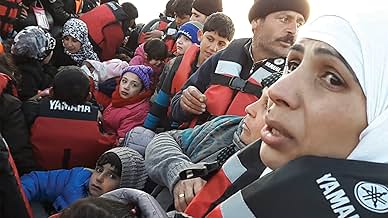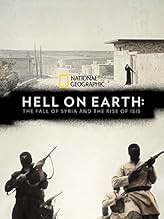AVALIAÇÃO DA IMDb
7,6/10
816
SUA AVALIAÇÃO
Adicionar um enredo no seu idiomaA look at the current state of Syria amidst war and chaos in 2017, featuring stories of survival and observations by political experts from around the world.A look at the current state of Syria amidst war and chaos in 2017, featuring stories of survival and observations by political experts from around the world.A look at the current state of Syria amidst war and chaos in 2017, featuring stories of survival and observations by political experts from around the world.
- Prêmios
- 3 vitórias e 2 indicações no total
Amr Al-Azm
- Self - Middle East Institute
- (as Dr. Amr Al-Azm)
Abdul Jabbar Al-Oqaidi
- Self - Colonel, Free Syria Army
- (as Col. Abdul Jabbar Al-Oqaidi)
Mahmoud Al Basha
- Self
- (as Mahmoud Al-Basha)
Matthew Bogdanos
- Self - District Attorney, Manhattan, NY
- (as Col. Matthew Bogdanos)
Paul Bremer
- Self
- (cenas de arquivo)
George W. Bush
- Self
- (cenas de arquivo)
David Cameron
- Self - British Prime Minister
- (cenas de arquivo)
James Wright Foley
- Self
- (cenas de arquivo)
Lindsey Graham
- Self
- (cenas de arquivo)
- (as Sen. Lindsey Graham)
Enredo
Você sabia?
- CuriosidadesFor filming a pipeline in Iraq, Nick Quested was arrested.
- Citações
Nick Quested: A camera can be as powerful a gun - in some ways more powerful.
Avaliação em destaque
Greetings again from the darkness. Co-directors Sebastian Junger and Nick Quested previously collaborated on a trilogy focusing on the Afghanistan War, including the Oscar nominated Restrepo (2010). Mr. Junger is also a best-selling author and Mr. Quested (a producer) is an Emmy winner. This time out they focus on the Syrian War, the plight of refugees, and the role of West in creating ISIS.
This is a National Geographic sponsored documentary, and though it's a bit overly politicized, it's also an extremely well made, detailed, and informative overview for those looking to catch up on the past seven years in Syria. Some of the front line video is stunning and affecting in its clarity of atrocities. In addition to the clips, pointed interviews with a mixture of types provide information and insight that we might otherwise misinterpret or remain oblivious to. Activists, journalists, refugees, politicians (including the recently dismissed National Security Adviser Michael Flynn) and soldiers all offer perspective on a situation that is difficult for most of us to comprehend.
Understanding the political strategy of President Bashar Al-Assad clarifies what to outsiders made little sense. Rather than allow the reform movement to gain traction, he instigated and encouraged the Civil War within his country - with the plan to have the military crush the uprising and gain power. The decision is difficult to swallow the leader of a country choosing to slaughter his own people. It also led to what's known as the Free Syrian Army – a confluence of various groups of citizen militias.
Ensuring this plays like a real life horror film, we see ISIS recruitment videos. These are brutally explicit propaganda with extraordinarily high production value. Beheadings, public hangings and other torture are presented in a manner designed to give hope and power to those who have little hope. It's terrifying.
We follow the story of brothers Radwan and Marwan and their families as they struggle to survive and escape. It seems to be a call to action for those opposed to accepting Syrian refugees, especially when combined with the filmmakers' finger-pointing at the U.S. for political decisions that (they argue) led to the strengthening of ISIS. There is also an emphasis on President Obama's infamous "red line" statement, on which he reneged on his promise to act if chemical weapons were used.
It is fascinating to hear a portion of an interview with Anna Erelle, author of "In the Skin of a Jihadist". She's a journalist who risked her life going undercover, and probably deserves her own documentary – though it's doubtful she wishes to lose what's left of her privacy. It's said that a radical movement is formed out of desperation, and with half of the Syrian population displaced, and more than 400,000 dead, desperation seems an understatement. The film is probably the best yet in its depiction of what has happened, but watch out for those puddles of finger-pointing.
This is a National Geographic sponsored documentary, and though it's a bit overly politicized, it's also an extremely well made, detailed, and informative overview for those looking to catch up on the past seven years in Syria. Some of the front line video is stunning and affecting in its clarity of atrocities. In addition to the clips, pointed interviews with a mixture of types provide information and insight that we might otherwise misinterpret or remain oblivious to. Activists, journalists, refugees, politicians (including the recently dismissed National Security Adviser Michael Flynn) and soldiers all offer perspective on a situation that is difficult for most of us to comprehend.
Understanding the political strategy of President Bashar Al-Assad clarifies what to outsiders made little sense. Rather than allow the reform movement to gain traction, he instigated and encouraged the Civil War within his country - with the plan to have the military crush the uprising and gain power. The decision is difficult to swallow the leader of a country choosing to slaughter his own people. It also led to what's known as the Free Syrian Army – a confluence of various groups of citizen militias.
Ensuring this plays like a real life horror film, we see ISIS recruitment videos. These are brutally explicit propaganda with extraordinarily high production value. Beheadings, public hangings and other torture are presented in a manner designed to give hope and power to those who have little hope. It's terrifying.
We follow the story of brothers Radwan and Marwan and their families as they struggle to survive and escape. It seems to be a call to action for those opposed to accepting Syrian refugees, especially when combined with the filmmakers' finger-pointing at the U.S. for political decisions that (they argue) led to the strengthening of ISIS. There is also an emphasis on President Obama's infamous "red line" statement, on which he reneged on his promise to act if chemical weapons were used.
It is fascinating to hear a portion of an interview with Anna Erelle, author of "In the Skin of a Jihadist". She's a journalist who risked her life going undercover, and probably deserves her own documentary – though it's doubtful she wishes to lose what's left of her privacy. It's said that a radical movement is formed out of desperation, and with half of the Syrian population displaced, and more than 400,000 dead, desperation seems an understatement. The film is probably the best yet in its depiction of what has happened, but watch out for those puddles of finger-pointing.
- ferguson-6
- 5 de jun. de 2017
- Link permanente
Principais escolhas
Faça login para avaliar e ver a lista de recomendações personalizadas
- How long is Hell on Earth: The Fall of Syria and the Rise of ISIS?Fornecido pela Alexa
Detalhes
- Data de lançamento
- País de origem
- Centrais de atendimento oficiais
- Idiomas
- Também conhecido como
- Syria: Piekło na ziemi
- Locações de filme
- Empresas de produção
- Consulte mais créditos da empresa na IMDbPro
- Tempo de duração1 hora 39 minutos
- Cor
Contribua para esta página
Sugerir uma alteração ou adicionar conteúdo ausente

Principal brecha
By what name was Hell on Earth: The Fall of Syria and the Rise of ISIS (2017) officially released in India in English?
Responda


























